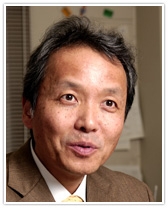Keynote Address
- Developing practical systems with firm foundations and studying foundations applicable to practical systems
- Setsuo Arikawa (President of Kyushu University)
- Date : Tuesday, June 12th, 13:30 ? 15:00 (90min)
- Abstract :
I have been involved in research and education of informatics including AI for nearly a half century from the stage of its creation, and also concerned with how informatics should be developed and supported through several committees set up in our government and some other organizations as a member and a chairperson. Although for these six to seven years I could not engage directly in such work on informatics because of the administration and management at my university, I have been taking part in making several proposals and showing some directions on the studies of informatics through the committees.
In this lecture, by showing some real examples I am going to talk about the basic ideas or principles as shown in the title, on which I had developed my research and education on informatics, especially on AI, and then touch on my experience on setting up scientific communities and the managements of computer center, library, and the whole university from the viewpoints of informatics and AI studies. And also I would like to express my expectations for researchers and students about current research and education of informatics and AI.
Invited Talk
- Towards Vocal Robot based on Cognitive Developmental Robotics
- Minoru Asada (Professor of Osaka University)
- Date:Wednesday, June 13th, 13:10 ? 14:40 (90min)
- Abstract:
One of the big issues of human cognitive development is language acquisition process, and constructive approaches have been attacking the issue to understand this process by building vocal robots. This talk gives a survey on these approaches. First, cognitive developmental robotics is briefly introduced to show a general idea of these approaches. Then, learning of vowel vocalization by parrot-like teaching is shown as one of the model of the interaction between an infant and a caregiver. Physical embodiment (less deformation of vocal tract and less energy consumption) enabled the reduction of vowel ambiguity (large variations). In this experiment, auditory feedback of the learner has not been considered. Then, a method is proposed to find the vowel mapping between a caregiver and an infant (learning robot) who have different utterable regions through the auditory feedback of the learner. Next, a sensori-motor magnet effect and caregiver’s anticipation during the interaction process are analyzed, and as a result, it is shown how caregiver shapes the infant vowels. Finally, future issues are discussed towards language acquisition by cognitive developmental robotics.


